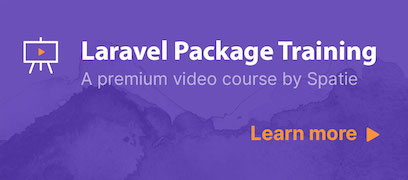Under development, do not use!
So you've got an application with some settings, these settings are stored within your database, a redis instance or something else and you want to have access to them through your whole application. Wouldn't it be cool if these settings were typed objects that you could inject everywhere in your application? With as an added bonus that your ide can typehint these settings?
In this package you can create a settings DTO:
class GlobalSettings extends Settings
{
public string $timezone;
public bool $enable_submissions;
public static function group(): string
{
return 'global';
}
}Now wherever you can inject something in your Laravel application (for example in the controller) and get values from the settings:
public function currentTime(GlobalSettings $settings){
return Carbon::now()->withTimezone($settings->timezone);
}Saving settings can be done as such:
public function updateTimezone(GlobalSettings $settings, Request $request){
$settings->timezone = $request->input('timezone');
$settings->save();
return redirect()->back();
}Learn how to create a package like this one, by watching our premium video course:
We invest a lot of resources into creating best in class open source packages. You can support us by buying one of our paid products.
We highly appreciate you sending us a postcard from your hometown, mentioning which of our package(s) you are using. You'll find our address on our contact page. We publish all received postcards on our virtual postcard wall.
You can install the package via composer:
composer require spatie/laravel-settingsYou can publish and run the migrations with:
php artisan vendor:publish --provider="Spatie\LaravelSettings\LaravelSettingsServiceProvider" --tag="migrations"
php artisan migrateYou can publish the config file with:
php artisan vendor:publish --provider="Spatie\LaravelSettings\LaravelSettingsServiceProvider" --tag="config"This is the contents of the published config file:
return [
/*
|--------------------------------------------------------------------------
| Settings
|--------------------------------------------------------------------------
|
| You can register all the settings dto's here
|
*/
'settings' => [
],
/*
|--------------------------------------------------------------------------
| Migrations path
|--------------------------------------------------------------------------
|
| When creating new setting migrations, the files will be stored in this
| directory
|
*/
'migrations_path' => database_path('settings'),
/*
|--------------------------------------------------------------------------
| Default repository
|--------------------------------------------------------------------------
|
| When no repository explicitly was given to a settings dto this
| repository will be used for loading and saving settings.
|
*/
'default_repository' => 'database',
/*
|--------------------------------------------------------------------------
| Repositories
|--------------------------------------------------------------------------
|
| In these repositories you can store you own settings, types of
| repositories include database and redis, or you can create
| your own repository types.
|
*/
'repositories' => [
'database' => [
'type' => Spatie\LaravelSettings\SettingsRepositories\DatabaseSettingsRepository::class,
'model' => \Spatie\LaravelSettings\Models\SettingsProperty::class,
'connection' => null,
],
],
/*
|--------------------------------------------------------------------------
| Repositories
|--------------------------------------------------------------------------
|
| Types other than the primitive PHP types can be converted from and to
| repositories by these casts.
|
*/
'casts' => [
DateTime::class => Spatie\LaravelSettings\SettingsCasts\DateTimeCast::class,
DateTimeImmutable::class => Spatie\LaravelSettings\SettingsCasts\DateTimeImmutableCast::class,
Carbon::class => Spatie\LaravelSettings\SettingsCasts\CarbonCast::class,
CarbonImmutable::class => Spatie\LaravelSettings\SettingsCasts\CarbonImmutableCast::class,
],
];Let's get started by creating a Settings Dto, under the hood this is actually a data-transfer-object from our data-transfer-object package. A Settings Dto is a class that extends Settings and has a static function group, that's a string describing to which group of settings it belongs.
class GlobalSettings extends Settings
{
public string $timezone;
public bool $enable_submissions;
public static function group(): string
{
return 'global';
}
}You can create multiple groups of settings each with their own Dto, you could for example have GlobalSettingswith the global group and BlogSettings with the blog group. It's up to you how to structure these settings.
Although it is possible to use the same group for different Dto's we don't recommand using a group identifier more than once.
You can add this settings DTO to your config file in the settings section, so it can be injected into the application when needed. Or let the package autodiscover settings, more on that later.
composer testPlease see CHANGELOG for more information on what has changed recently.
Please see CONTRIBUTING for details.
If you discover any security related issues, please email [email protected] instead of using the issue tracker.
The MIT License (MIT). Please see License File for more information.



